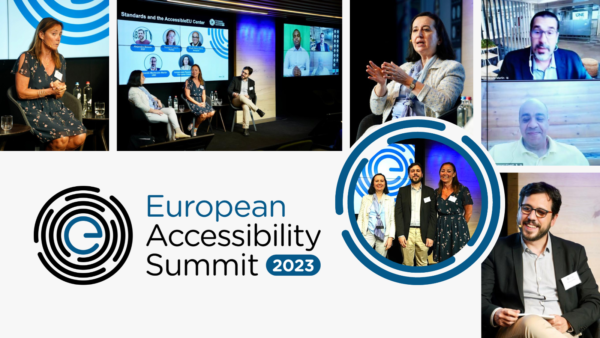Last summer, the European Commission launched the European Accessibility Resource Centre, AccessibleEU, a new service supporting the implementation of accessibility across the European Union.
On the occasion of the Accessibility Summit 2023, organised with the support of Microsoft, we gathered stakeholders from various sectors to discuss the relation between Standards and the AccessibleEU Centre.
The role of the disability community in the development of standards
The panel “A Conversation on Standards and the AccessibleEU Centre” was moderated by Alejandro Moledo, Deputy Director of the European Disability Forum (EDF) who highlighted the role of EDF and the disability community in the development of standards. He said:
What we are trying to achieve in standardisation is to really set the baseline for accessibility to be certain for users of industry, and from there, we can be more inclusive. From the disability community is very important to be involved in standardisation. Obviously, we cannot replace the expertise of an architect or engineer, but we are experts of our lived experiences.
Later, Alejandro added that one of the main missions of the AccessibleEU Centre is to support the work of disability organisations in standardisation.
Setting binding accessibility goals across EU Member States
Inmaculada Placencia Porrero, Senior Expert in Disability and Inclusion at the European Commission, explained the importance of The European Accessibility Act (EAA), an EU Directive that sets binding accessibility goals to be achieved by all the Member States. She explained that the European Commission is asking to revise standards on Information and Communication Technology (ICT), built-environment, and design for all, and to develop new standards on support services, digital information and European emergency number 112. She added:
The world is shaped by standards. Now that we have the Accessibility Act and a benchmark of other successful initiatives, we are looking at those standards that we already have and making sure that they reflect the requirements that we have for the European Accessibility Act and the requirements of the Web Accessibility Directive.
The importance of standards for the industry
Shadi Abou-Zahra, Principal Accessibility Standards and Policy Manager at Amazon highlighted why these technical standards are so crucial from the industry perspective. He said:
Standards provide transparency and reliability. They are the basis, but not a replacement for the users’ experience. We always need to put users first. Following standards as a simple checklist is the wrong approach. This is not only for implementers and industry at large, but it is for anybody who is trying to implement and comply with the European Accessibility Act. The EAA has Annexe 1, which defines requirements which are quite detailed for legislation but not really detailed enough to really apply. So, we do need the standards to guide us.

Making every voice heard in the standardisation creation process
Susanna Laurin, Chief Research and Innovation Officer at Funka and chair of the Joint Technical Body responsible for the European standard EN 31549 on Information and Communication Technology (ICT), explained how standardisation works and how people can get involved in the process of standards:
There will be a special task force working on writing new text and having discussions. And when they have something to show, the joint technical body will discuss this. My job is to make sure we reach a consensus. It will go back and forth but this is an iterative process. Before June 2025, when everything should be compliant, we need to provide this standard to the world. We are also opening the group for comments to other new experts not just to the experts who are working on standards every day.
Building capacity for accessibility in EU countries
Fernando Machicado, Stakeholder Engagement Coordinator, Spanish Association for Standardisation (UNE) focused on the new AccessibleEU Centre the European network on accessibility, working on the areas of built environment, transport, information, communication technologies and policies in order to ensure persons with disabilities’ participation in all areas of life on an equal basis with others.
Fernando highlighted the main goal of AccessibleEU, which is to facilitate the practical application of EU legislation on accessibility to improve the availability of more accessible products, services, and infrastructures across the EU. Fernando said:
With the AccessibleEU Centre, we are participating in the revision and development of new standards. We would like to build the capacity for accessibility in EU countries, supporting the implementation of the European Union legislation on accessibility. With the AccessibleEU Centre, we want to listen to all our experts and community of practice.
Further, explore the topic
If you missed the European Accessibility Summit 2023 and the session on “Enabling an accessible digital work environment”, you can watch the recording of the event.
About the European Accessibility Summit 2023
The 2023 edition of the European Accessibility Summit was organised by the European Disability Forum and supported by Microsoft.
You can find more info on the agenda, speakers and recordings on the event page.